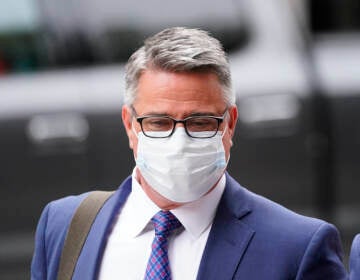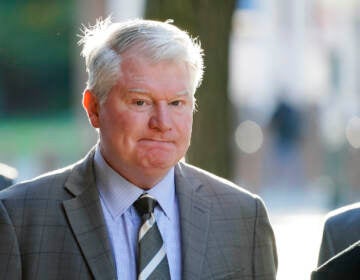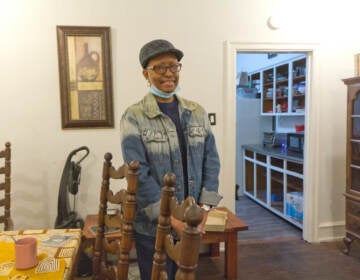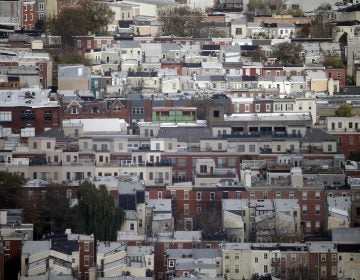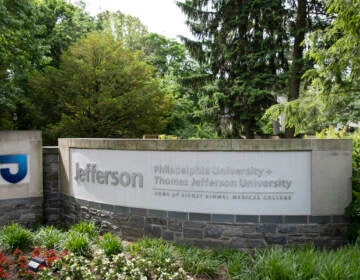Prosecutors tell jurors to hold Dougherty and Henon ‘accountable’ as bribery trial closes
Assistant U.S. Attorney Frank Costello argued that Dougherty “bought Henon” in the government’s closing courtroom argument.
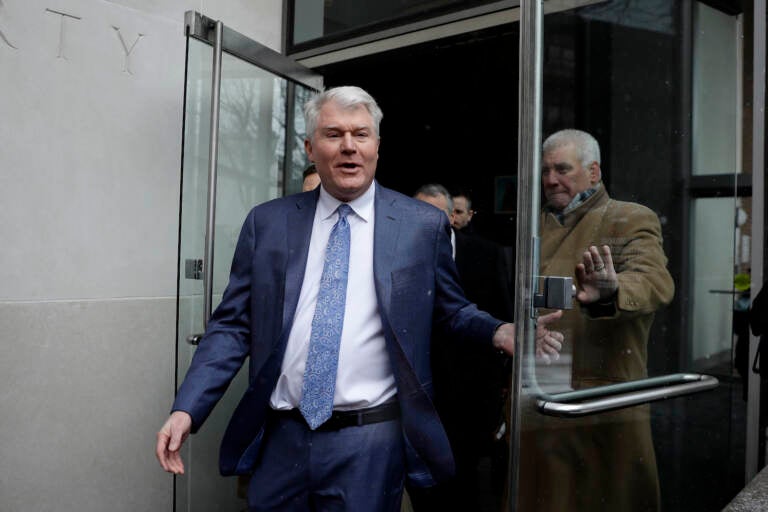
File photo: John ''Johnny Doc'' Dougherty, Local 98 leader, departs the federal courthouse, Friday, Feb. 1, 2019, in Philadelphia. (AP Photo/Matt Slocum)
Federal prosecutor Frank Costello made the government’s closing argument in the corruption trial of Councilmember Bobby Henon and electricians union leader Johnny “Doc” Dougherty, hammering the key points he said must lead the jury to convict the two men.
Time and time again, in 2015 and 2016, the councilmember subordinated the needs of his Philadelphia constituents to the demands of Dougherty, who bribed Henon with a salary and benefits for a no-show union job and other perks, Costello argued Monday in federal court.
“Simply put, Dougherty bought Henon, so Henon would do what Dougherty wanted him to do in the City Council of Philadelphia,” the Assistant U.S. Attorney told the jury during a two-hour-long review of evidence. “Henon sold his office to John Dougherty.”
Dougherty, the business manager of IBEW Local 98, “got Henon’s votes, he got his public resources, the use of his staff,” the prosecutor said. “His ability to hold hearings, to delay hearings, to draft resolutions and bills, and to oppose resolutions and bills. The public did not receive the benefit of Henon’s services…as it was entitled to.”
Costello’s statement and the defense attorney statements that will come this afternoon mark the final stages of a six-week trial during which jurors have listened to many hours of witness testimony and were shown or played dozens of recorded phone calls, texts, and emails between Henon, Dougherty, officials from Local 98 and other unions, other politicians and city officials, and executives from Comcast and Verizon, among others.
After weeks of relatively light attendance, the courtroom was packed. Henon’s wife, mother, brother, and one of his two sons, along with other family and friends of the two defendants were on hand to watch the attorneys make their final arguments. Union supporters also surrounded the entrance to the federal courthouse in the morning.
Good faith actions or bribes?
Lawyers for Henon and Dougherty reject the charges, saying that Henon was a legitimate half-time employee of Local 98 who earned $70,000 a year. They say the councilmember performed his council activities in good faith to serve the needs of his constituents, particularly his fellow union members. In other instances, they argued his behavior did not constitute substantive action and thus could not be considered a favor done in exchange for a bribe.
Costello listed off the actions Henon allegedly took on Dougherty’s behalf, beginning with a promise to hold hearings about tow truck companies. The prosecutors allege that after Dougherty was angered by having his car towed in 2015, he complained to Henon, who had a staffer draft a bill calling for a hearing on the one tow company that had crossed Dougherty, although the hearing was ultimately never held.
Henon also agreed to introduce a bill to adopt the International Plumbing Code and then put a hold on the bill in order to give him and Dougherty control over the plumber’s union, which opposed the measure, prosecutors say. Dougherty allegedly wanted Henon to act because the plumbers did not support his bid to lead the Building and Construction Trades Council, an umbrella group of unions.
On two occasions, prosecutors allege Henon helped Dougherty get the Departments of Licenses & Inspection to issue stop work orders on the installation of MRI machines at the Children’s Hospital of Philadelphia. They also said Dougherty told Henon to call Carlton Williams, the L&I commissioner at the time, because the work was being done by non-union electricians.
When Comcast was trying to have city council approve a renewal of its cable franchise agreement, Dougherty allegedly urged Henon to hold up the agreement until the company agreed to hire more union workers. Henon arranged two meetings between Comcast executives and Dougherty, effectively allowing the union boss to take his place in the franchise negotiations, prosecutors say.
Prosecutors also say the two men schemed to have council pass a soda tax as retribution against the Teamsters union, which represents beverage truck drivers. According to the indictment, Henon and Dougherty were angry over a dispute related to a union picket of the Pennsylvania Convention Center and the Teamsters’ refusal to endorse Dougherty’s brother, Kevin Dougherty’s run for state Supreme Court.
Henon is also charged with accepting a bribe of window glass from former Philadelphia Parking Authority chair Joseph Ashdale in exchange for opposing a proposed audit of the PPA, and a bribe of campaign contributions from the Communications Worker of America for holding a hearing that created negative publicity for Verizon, which CWA was striking at the time.
“You need to hold them accountable,” Costello told the jury. “This is not okay. This is a crime.”
The “scary part,” Costello said, is if the FBI had not started wiretapping the two men’s phones in 2015, their corrupt activities would remain unknown.
“This ends here. This ends now. The people of Philadelphia deserved better. The evidence presented to you points to only one reasonable conclusion you can make, and that’s to find the defendants guilty as charged,” he concluded.
Union brothers?
Defense attorneys used their closing statements both to pick apart the details of the prosecutors’ arguments and to broadly argue that Henon and Dougherty were of one mind on union issues, making the notion of a bribery agreement between them nonsensical.
Dougherty’s attorney Henry Hockeimer stressed that to prove corruption, prosecutors must show that a public official has performed specific actions he might not otherwise take in exchange for a bribe.
But Henon, who had been a member of Local 98 since 1989, and ran for office as an avowedly pro-union candidate, already agreed with Dougherty’s positions and would have acted in the same way whether or not he was on the union payroll, the attorney argued.
“Mr. Henon bleeds labor. He’s a union guy through and through. That’s Bobby Henon. He was going to do these things anyway,” Hockheimer said.
“At the end of the day what this case is about is a labor leader supposedly bribing a pro-labor city councilmember to advance the interests of labor. There’s no bribe under that rubric,” he said.
For example, the claim that Henon’s actions were “nefarious” or unusual when he called then-L&I commissioner Carlton Williams and asked him to inspect the installation of MRI machines by unlicensed, non-union workers, is “nonsense,” the lawyer argued.
“He’s just conveying information [that] there’s an unlicensed contractor at Children’s Hospital. He would do that anyway. He calls L&I all the time about stuff. And not just for Local 98 or Mr. Dougherty — for anyone,” he said.
Dougherty also could not have been bribing Henon because the alleged favors he received did not benefit him alone, or even Local 98 specifically, Hockeimer argued. Meetings Henon arranged between Dougherty and Comcast were unremarkable, typical union negotiations with a large employer, and benefited unions other than Local 98, such as those who dug up roads so cable could be laid, he said.
Henon’s attorney Brian McMonagle made similar arguments about union sentiment, but only after first delivering a lengthy introduction in which he told the jury to “decide this case as if the rest of a man’s life depends on it.”
He displayed pictures of Sylvester Stallone in “Rocky,” the Art Museum steps, the National Constitution Center, and the Comcast Center, and listed off different groups of unionized workers, including construction tradespeople such as sprinkler fitters and Teamsters, as well teachers, nurses, and police officers who “run to the sound of gunshots.”
McMonagle took aim at Costello for pointing out that Henon had described himself as an electrician for Local 98 on a financial disclosure form, saying, “It may not mean much… But I know what it means to him. Until he closes his eyes for the last time, when he writes down what he is, he will write down ‘electrician.’”
He mocked prosecutors’ assertion that Henon was Dougherty’s puppet, telling the jury that the two are the closest of friends, with a shared loyalty to the union movement and a shared background as electricians.
“They’re not friends? They’ve been on those wires for years. And yes, there are moments when friends don’t act like friends on the phone. Ever had that experience in your lives? Does that mean you’re not friends? They’re brothers,” McMonagle said.
Henon and other Local 98 members “have one thing in common. They wake up every day and pray this guy wakes up too,” he continued, pointing to Dougherty in the courtroom. “Prays he goes out and fights for every inch, for every job. He’s trying to get every job he can for every member of his union. And that ain’t a crime.”
In a hurried rebuttal at the end of the day’s proceedings, Assistant U.S. Attorney Bea Witzleben dismissed the defense’s union brotherhood argument.
“If this man had actually been an electrician for Local 98, we wouldn’t be here. This is not an anti-labor case. This is not an anti-working man case. This is a corruption case,” she said.
Dougherty only had Local 98 give Henon $135,000 a year in salary, benefits, and tickets to sporting events — the equivalent of a quarter of a million dollars over two years — for doing little or no official union work because he could not otherwise be sure the councilmember would do his bidding, Witzleben argued.
“Why pay Henon a quarter of a million… if he can get everything he wants without paying him? He can’t! So he pays him,” she said.
She pointed to what she described as one critical moment when Dougherty exercised his influence over Henon during the Comcast negotiations, which the councilmember had shepherded for months through meetings with many different stakeholders.
Witzleben said Dougherty suddenly learned the agreement did not include the union concessions the Local 98 leader wanted and angrily demanded the councilmember put a last-minute hold on the legislation. Henon sent a late-night email to his chief of staff, who responded with annoyance, saying the councilmember must have some information she was unaware of.
“Mr. Henon’s private boss, Mr. Dougherty, didn’t like the deal Mr. Henon struck, using labor’s input and everybody’s input. He doesn’t know what to do. At midnight, there’s this panic. You can feel it,” she said. Torn between the needs of the public and the demands of Dougherty, Witzleben said Henon finally gave in, telling Dougherty, “We do have the best deal ever…but I’m not going to do it without us, right, you.”
“There it is in a nutshell,” the prosecutor said. “That’s why [Dougherty] has to pay him. Because he can’t be sure” Henon will do his bidding otherwise.
The trial will continue Tuesday morning with Judge Jeffrey Schmehl delivering lengthy instructions to the jury and the jurors then beginning their deliberations.
The trial takes place two years after federal prosecutors brought a 116-count indictment against Henon, Dougherty, and several people with ties to Local 98. The charges have been split into two trials, with the current case focusing on the bribery charges against Henon and Dougherty.
Disclosure: The Electricians Union Local 98 represents engineers, camera personnel, editors, audio and maintenance techs at WHYY.

Subscribe to PlanPhilly
WHYY is your source for fact-based, in-depth journalism and information. As a nonprofit organization, we rely on financial support from readers like you. Please give today.




